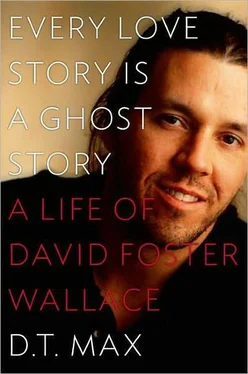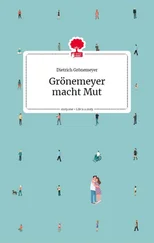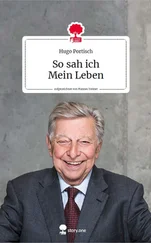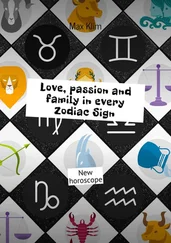By the time Wallace returned to Illinois State from his Supposedly Fun Thing book tour in the spring of 1997, he was already worried about his fiction writing. Predictably the effort to produce Infinite Jest had left him feeling wrung out. This sense of depletion had not surprised him at first. He had crafted the beginning of the novel in Boston in the early 1990s, expanded and improved it in Syracuse, and by the time he got to Bloomington in July 1993 he was mostly rewriting and responding to Pietsch’s edits. That had taken up the next year or so. But by 1995 he had been hoping — expecting — to start something else. It was his assumption that the new thing would be a novel too. The novel was the big form, the one that mattered, that reviewers and other authors cared about and by which he could fulfill his compact with readers. DeLillo’s published writing consisted almost entirely of novels; so did Cormac McCarthy’s.
The freedom success now brought left Wallace uneasy; in his life, he had worked to narrow his choices, to give himself a simple set of instructions — don’t drink or smoke pot; don’t try to impress others to make yourself feel better. But on the page things were more complex. He knew that he had to write for himself and not think about the reader, but that was easier to enunciate than to enact. He would have conversations during this period with Costello where he would complain about how hard it was now to get the words down in the right order. Since Amherst, he and Wallace had had as a touchstone of good writing John Keats’s poem “This Living Hand”:
This living hand, now warm and capable
Of earnest grasping, would, if it were cold
And in the icy silence of the tomb,
So haunt thy days and chill thy dreaming nights
That thou would wish thine own heart dry of blood
So in my veins red life might stream again,
And thou be conscience-calm’d — see here it is—
I hold it towards you.
Wallace would talk about wanting in his writing to “make the hand come out,” and then, in disappointment afterward, “The hand, Mark — there’s no hand.” Costello worried that his friend was being too negative about his own work, that success had tipped his delicate internal balance.
When Infinite Jest was done, Wallace found himself more comfortable with shorter fiction. The value of this writing was unclear to him, though, and did not make him feel he was using his time well. “Writing is going shittily here,” he wrote to DeLillo in September 1996. “I’ve spent all summer doing dozens of obscure ministories that seem neither comprehensible nor interesting to anyone else.” He told Brad Morrow at Conjunctions that he spent his days in his black room, writing “weird little 1-pagers.” Some were about “the spiritual emptiness of heterosexual interaction in post-modern America,” as he would phrase it in a later interview, others almost metaphysical aperçus about the hazy intersection of cognition and the world, vignettes he grouped together under the heading “Another instance of the Porousness of Certain Borders.” What had made the scope of his imagination contract so radically? He blamed himself, rather than, say, fatigue or age. He thought perhaps other authors had less trouble. The year before he had turned back to the writer whom he most admired for help. He had a “jejune” question for DeLillo — like “some kind of tentative hand in the back row of a writer’s classroom visit or something.” He went on, “Do you have like a daily writing routine? Do you set off certain intervals as all and only time for fiction-writing? More important, do you then honor that daily obligation, day after day? Do you have difficulties with procrastination/avoidance/lack of discipline? If so, how do you overcome them?”
I ask because I’m frustrated not just with the slowness of my work but with the erratic pace I work at. And I ask you only because you seem at least on this end of the books, to be so steady — books every couple or so years for over two decades and you don’t seem to have an outside job or teaching gig or anything that might relieve (what I find to be) the strain of daily self-starting and self-discipline and daily temptations to dick around and abandon the discipline. Any words or tips would be appreciated and kept in confidence.
DeLillo wrote back to reassure the thirty-three-year-old Wallace that centering yourself to write got easier over time, though it never got easy. “The novel,” he wrote his younger friend, “is a fucking killer. I try to show it every respect.” This perhaps satisfied Wallace for a time, but his hand was up again a month later. Why, he asked his adopted role model, did the route to maturity have to be such a struggle?
Maybe what I want to hear is that this prenominate war is natural and necessary and a sign of Towering Intellect: maybe I want a pep-talk, because I have to tell you I don’t enjoy this war one bit. I think my fiction is better than it was, but writing is also less Fun than it was.
“All right,” DeLillo replied, a bit more sharply this time, “your first book was more fun but that doesn’t mean you’ve left pleasure behind forever.” For him, at least, it was the act of writing that carried him forward: “I have fun when I find myself gliding on language and when the story seems to drive itself forward and when I’m able to give a character his or her most unexpected expression,” he wrote. Still, novel writing, with its isolation and the uncertainty about what one had achieved, was never going to be a picnic. Wallace had to understand that. He offered a kind of buck-up, disputing Wallace’s distinction between his “bad” early work and his “good” later work:
And I don’t see that the occasional acrobatics in Girl with Curious Hair are a form of exhibitionism. And I don’t see anything in the early pages of [ Infinite Jest ] that would lead me to believe that you are dying of funlessness. But of course reader and writer are dealing from different perspectives. Where you see fun in my work, I remember doubt, confusion and indecision, and now experience considerable regret, particularly over the earlier books.
And he ended with a compliment, meant to give Wallace a sense of belonging to an elite for whom this sort of suffering was the price of membership:
When I say the novel is a killer, I am reserving this designation for writers who are smart enough, sensitive enough and good enough to realize the dangers and consequently to respect the form. You have to be good before you even sense the danger, or before you can understand what it takes to succeed. Let the others complain about book tours.
It’s unlikely this comforted Wallace. For him there had to be a huge difference between the tone of his early work and Infinite Jest —not just his literary development but his actual physical survival was embodied in the difference. Now Wallace cast about for different ways to motivate himself. He invited Charis Conn from Harper’s to stay with him for a semester to work on her novel, putting at once a competitor and a watchdog in his spare bedroom. (He dubbed his house “Yaddo West.”) He quit smoking, took it up, quit it again. He tried teaching new classes to spur his interest in his day job. In the spring of 1997 he taught a course with Doug Hesse, a colleague in the English department, on creative nonfiction, which they defined in a handout they gave the class as “a somewhat problematic term for a broad category of prose works such as personal essays and memoirs, profiles, nature and travel writings of a certain quality, essays of ideas, new journalism, and so on.” 4The same semester he designed and taught a class on great novels of the twentieth century, “basically,” as he wrote in the course syllabus, “a contrived, excuse/incentive to read several interesting, difficult U.S. novels…. The class is to function as a large, sophisticated, energetic reading group.” “I’m gearing up to do 2 DeLillo, 2 Gaddis, 2 McCarthy…and 1 Gass. Death by fiction,” he wrote Steven Moore with pride.
Читать дальше












